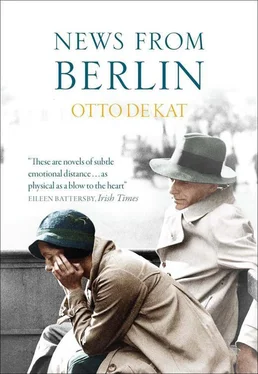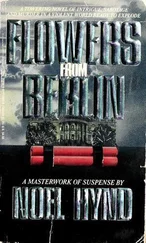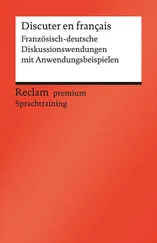Operation Barbarossa, a code name for murder, obviously, even as it was a childish appeal to old myths and legendary heroes. Super-kitsch, if it weren’t for the deadly intent. Emma had been incapable of keeping the news to herself. She had blurted it out to her father, who she was sure would know what to do. The fear in her tone had been unmistakable, as well as the urgent, unvoiced appeal for action.
At the station of Lausanne he had got off, feeling choked by the stuffiness of his compartment, and even more by the turmoil in his mind. He had no appointments in Berne that evening, so there was plenty of time for a stroll by the lake. Trees and bushes were heavy with blossom on this late afternoon of May 28, in the second year of the war. The boulevard was agreeably alive with strolling couples, cyclists, sailors, tourists. Oscar wandered off in the direction of the music he could hear in the distance. It came from the terrace of Hôtel Beau Rivage, where a small orchestra was playing English tunes – emphatically English, he thought. A few tables were still vacant. He sat down, ordered a glass of Dôle, and waited. Spring on the shore of Lake Geneva. As though time stretched out into forever.
He watched the gulls flying in wide arcs over the water. Where on earth did all those birds come from? They belonged by the sea, surely. He remembered standing at the window as a boy and throwing out crusts of bread for the gulls to catch, which they did with ease, somersaulting through the air, watching him with their orange beady eyes.
And so Oscar sat, wrapped up in his thoughts, at a neatly laid table not far from the band: violinists in dinner jackets, pianist in evening dress, trombone player in red. Uniforms of peace, clownish outfits of neutrality. He picked up a newspaper left behind on a nearby table. Die Nation , extra edition. “BISMARCK SUNK” was the headline splashed across the entire front page, with further down, in much smaller font: “Crete All But Lost”. News from the front: filed by a reporter, typeset by a compositor, delivered by a paperboy, only to be discarded on a white tablecloth beside an empty wine glass on a summer’s evening. Texts such as these circled the globe, and were read without their portent being properly understood by anyone. A banner of blank letters, bloodless, hollow: Bismarck destroyed, Crete all but lost. Oscar read the paper; he knew what it said, but felt nothing. Everything going on simultaneously, all the things happening around him, it was all too much to grasp. Man’s imperviousness to what was going on outside his field of vision was extraordinary. He traced a pattern of lines on the tablecloth with his fork, stared at the newspaper, laid the fork down, signalled a waiter and asked for the menu.
“This morning shortly after daybreak, the Bismarck, virtually immobilised, without support, was attacked by British battleships that pursued her,” Churchill was quoted as announcing to the House of Commons. “And I have just received news that the Bismarck has sunk.” Applause. Hear, hear. Shortly after daybreak, Oscar mused. The bleak morning sky over a stormy sea. And then sinking, sinking to the bottom fast. Ears and eyes aflame, throats parched in terror and rage. How did such a calamity proceed, he wondered. The newspaper provided no answer, all was rumour and speculation. There were reports of hand-to-hand fighting in Crete, meaning the fixed bayonet, pistol in hand, grenade-packed belt, possibly even a knife between the teeth. Fighting and falling. Blown to bits, mown down, lost and destroyed. Headlines for polite discussion over a lakeside dinner. Shortly after dusk. Music.
Despondency crept up on him as he realised yet again how relentlessly things took their course, how simultaneously and obscurely, and how the significance kept eluding him of so many contradictory events taking place just a stone’s throw away. Nevertheless, he appeared unmoved as he pored over Die Nation , the only Swiss newspaper to persist in its anti-Nazi stance. On the whole the press took a back seat, leaning a little this way, then that. Shilly-shallying. Nothing new about human misery, sir, we have to put our foot down, we’re being inundated by refugees and it can’t go on; watch out, folks, let’s not rub our bad-tempered neighbour the wrong way; careful now, steady on. The hirelings of the press were forever glancing over their shoulders, unless holed up in their bunkers of shrewd impartiality. The journalists of Die Nation were the exception. Oscar had great respect for the editor, whom he had met in Berne. A driven man, who despised most of his fellow Swiss. He had visited the border crossings, had seen Jews being turned away without mercy. Anyone having witnessed that would never again rest easy, he had said. Murder at one remove: Death in a Swiss customs officer’s cap. His newspaper stood alone in daring to attack the government. Oscar did not always see eye to eye with the editor, although he too was critical of Swiss politics on various counts. In spite of the border restrictions, however, people still managed to get into the country. Oscar knew this; he worked closely with the people who smuggled them in, he knew the routes, the dangers, and the courage of certain Swiss men and women. On many a moonless night he had stood waiting for a small group to come over from France. Often in vain. Waiting was hardly a heroic activity, but each time just a few of them made it over the border it felt like a major victory.
His ruminations came to an abrupt halt. Something had stirred in the periphery of his vision. Then he recognised him. It was the way the man was lighting his cigarette, his head bent low as though scanning the ground at his feet. The same gesture had struck him at the restaurant in Geneva, during his lunch with Emma and Carl. He had been unaware of the man with the newspaper until that curious ducking of the head to light a cigarette. And so here he was again, on the far side of the terrace, engrossed in a magazine, a man like any other taking a rest after a stroll.
Oscar was unperturbed. Being followed was a frequent occurrence, he was used to it. At first he had found it intimidating and irksome, but in due course he was able to tell quite quickly whether or not someone was watching him. In Geneva, though, he was taken by surprise, engrossed as he was in the anticipation of seeing Emma and Carl again. He had promised himself he would provide Kate with a detailed description of how they looked, what they said, and how they were managing in Berlin. But as things stood, a letter was probably not an option. Oscar glanced at the shadow-man and considered actually beckoning him. Often an effective way of making the person back off in confusion. Could the word “Barbarossa” have been overheard? There had not been many people in the restaurant, and the sneak had been sitting at the next table. But no, Emma had spoken softly and rapidly, or rather, she had whispered. Whispering was suspicious, obviously, even if the man had been out of earshot. It would merit a brief report: O.V. with daughter in G. Whispered exchange in absence of C.B. Followed to L. then lost contact. 28.5.41. He would shake the man off, no trouble at all. He was trained in vanishing. This time he would fall back on the tried and trusted method of putting his hat and empty briefcase on the table, asking the waiter for the men’s room, going into the hotel, settling his bill there, and then making his exit by the back door. The Beau Rivage hotel had several back doors, so making a getaway without being spotted was not a problem. Not that it was necessary, beating a retreat, but he wanted to take some positive action. His vexation about the German watcher was greater than usual. He tried once more to recall exactly how clear Emma’s voice had sounded. Barbarossa. Although they had been speaking Dutch, that word could have been picked up by a German, any German. Especially a German. Barbarossa, what did that name remind him of? A medieval ruler, a tyrant of old, something Germanic, something from a revered past, something Hitlerian. Oscar’s brain, well-versed in history, took no time in coming up with the answer: the German emperor leading the crusades, twelfth century or thereabouts. That was the underlying idea, of course, it was all about a crusading ruler with endorsement from on high.
Читать дальше












